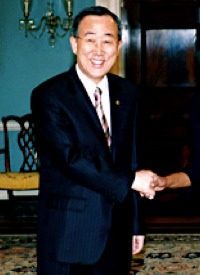
Speaking in Vienna at an August 28 event celebrating the 30th anniversary of the Austrian capital as a UN seat (along with New York, Geneva, and Nairobi), UN Secretary-General Ban Ki-moon said that Palestinians must be able to show a united front to successfully carry on peace negotiations with Israel.
"It will be crucially important that the Palestinian peoples are united among themselves and should be able to carry on these negotiations," the Secretary-General said at a news conference.
Talks between Israel and the Palestinians stopped following a change of government in Israel in March. However, Ban called on Israelis and Palestinians to relaunch the Middle East peace process now that President Barack Obama was "taking the lead in this process."
Reuters news cited Ban as stating that while the peace initiative endorsed at the 2002 Arab League summit provided a "cornerstone" for negotiations, "at the same time we also value … bilateral negotiations between Israel and Palestinian authorities." That initiative offered Israel recognition in return for its withdrawal of troops and settlers from all lands that it occupied during the 1967 Israeli-Arab war, the creation of a sovereign Palestinian state, and what the Arab nations termed a "just" solution for Palestinian refugees.
Power in the Palestinian territories is split between Fatah, the party of Mahmoud Abbas, based in Ramallah, West Bank, and the more overtly militant Hamas, led by Ismail Haniyeh, who was dismissed by Abbas, but continues to exercise prime ministerial authority in the Gaza Strip.
When the more radical Hamas party won the Palestinian Authroity’s legislative elections in 2006, Israel, the United States, Canada, and the European Union (all of which regard Hamas as a terrorist organization) froze all funds to the PA. Hamas has refused to recognize Israel’s right to exist, refuses to renounce violence, and has not agreed to abide by past agreements.
After the takeover in Gaza by Hamas in June 2007, PA Chairman Abbas dismissed the government and appointed Salam Fayad Prime Minister to form a new government. The new government claimed authority over all Palestinian territories, but since Hamas retains control of Gaza, Fatah/PA in reality exercises authority only over PA-controlled areas of the West Bank.
The PA is an offshoot of the radically militant Palestine Liberation Organization (PLO). Former PLO Chairman Yasser Arafat was elected as president of the PA in a landslide victory in 1996. Neither Israel not the United States had confidence in Arafat, because of his past terrorist connections, and refused to negotiate with him.
While both Palestinian factions have questionable histories, Fatah — even if only for the sake of achieving a more moderate image — has expressed a willingness to negotiate with Israel. If Fatah, at the behest of Ban Ki-moon, starts moving towards an accommodation with Hamas, the end result seems likely to be a step backwards towards both organizations’ radical roots during the days of Yasser Arafat.
The marriage between a more radical and less radical organization seldom results in moderate offspring.
Photo: UN Secretary General Ban Ki-moon



